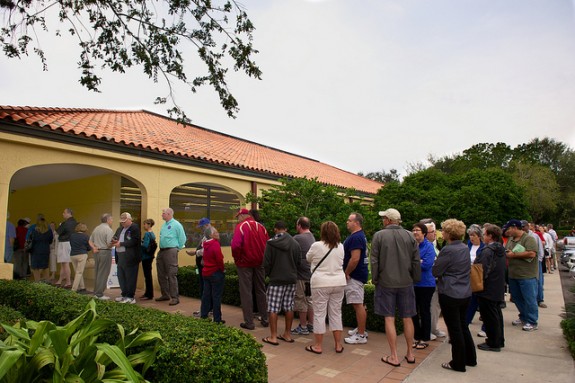
State lawmakers have now reversed the controversial 2011 law by restoring early voting. (Photo by Benjamin Thompson.)
By Ashley Lopez
Florida Center for Investigative Reporting
After a disastrous presidential election last year, the Florida Legislature and Gov. Rick Scott have restored the state’s early voting days, which were cut short in 2011 as part of a GOP-backed bill overhauling election laws.
The 2011 bill, HB 1355, cut early voting days, imposed strict rules for third-party groups registering voters, and made it harder for people moving within the state to vote, among other things. Voting rights groups said the bill was an unprecedented move to restrict access to the polls on Election Day in Florida.
Florida’s bill was among a slew of state-level bills from all over the country that voting rights groups said were part of an effort to suppress the votes of minorities, the poor and younger people — basically, the base of the Democratic Party. The bill was passed by the state Legislature, which had a Republican super-majority in both chambers, and was signed into law by Scott, at the time the state’s newly elected, Tea Party-backed governor.
As Ari Berman wrote in Rolling Stone in 2011:
As the nation gears up for the 2012 presidential election, Republican officials have launched an unprecedented, centrally coordinated campaign to suppress the elements of the Democratic vote that elected Barack Obama in 2008. Just as Dixiecrats once used poll taxes and literacy tests to bar black Southerners from voting, a new crop of GOP governors and state legislators has passed a series of seemingly disconnected measures that could prevent millions of students, minorities, immigrants, ex-convicts and the elderly from casting ballots. “What has happened this year is the most significant setback to voting rights in this country in a century,” says Judith Browne-Dianis, who monitors barriers to voting as co-director of the Advancement Project, a civil rights organization based in Washington, D.C.
Republicans have long tried to drive Democratic voters away from the polls. “I don’t want everybody to vote,” the influential conservative activist Paul Weyrich told a gathering of evangelical leaders in 1980. “As a matter of fact, our leverage in the elections quite candidly goes up as the voting populace goes down.” But since the 2010 election, thanks to a conservative advocacy group founded by Weyrich, the GOP’s effort to disrupt voting rights has been more widespread and effective than ever. In a systematic campaign orchestrated by the American Legislative Exchange Council – and funded in part by David and Charles Koch, the billionaire brothers who bankrolled the Tea Party – 38 states introduced legislation this year designed to impede voters at every step of the electoral process.
A study conducted by political researchers at Dartmouth and the University of Florida found that Florida’s law did just that: it made it harder to vote in 2012.
According to Daniel Smith of UF and Michael Herron of Dartmouth:
Our statewide data in conjunction with a natural experiment in two counties show that racial/ethnic minorities, as well as individuals registered Democratic and those registered without party affiliation, disproportionately bore the burden of House Bill 1355. Moreover, Florida counties with large 2012 early voting decreases compared to 2008 tended to have large increases in absentee voting. While substitution from early to absentee voting might appear sanguine, it is not. Absentee voting is risky due to the propensity for absentee ballots to be rejected, and the replacement of early with absentee voting should not be considered a panacea for limitations in the availability of the former.
Some areas in Florida had six-hour lines to vote on Election Day. Some precincts didn’t close until well after the election was called and President Barack Obama gave his victory speech.
The 2012 election was a national embarrassment and state lawmakers were forced to reverse the 2011 law, which was mostly to blame for the long lines.
A bill reversing many of the problematic provisions in the 2011 law passed during this year’s legislative session and was signed into law by Gov. Scott this week.
According to The Miami Herald:
The law not only restores the early voting to a mandatory 64 hours over eight days and up to 168 hours over 14 days, it also gives the 67 county supervisors of elections the discretion to schedule early voting on the Sunday before the election.
The law expands the pool of locations available for early voting and, for the first time, requires that vendors of voting systems disclose defects in their systems. It limits the wording of constitutional amendments lawmakers put on the ballot to 75 words. And the law partially restores a provision that allows voters to change their addresses on Election Day
The bill passed with bipartisan support in the Legislature. However, some voting rights groups have said lawmakers should have mandated longer poll hours during early voting, instead of leaving it up to local election supervisors.<
